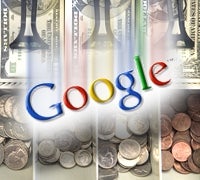 |
While Google talks up its efforts to build new lines of ad revenue, its dominance in search should carry it through the current economic downturn, according to financial analysts.
Yesterday afternoon, Google (NASDAQ: GOOG) reported second-quarter earnings that fell short of the analysts’ expectations, acknowledging for the first time that the economic slump had affected revenues. With Google’s shares down 10 percent today, the Street has punished the search engine for its underperforming quarter.
Still, advertisers’ shrinking budgets are likely to drive marketing dollars away from traditional media to search, which is more measurable and cost-effective — and also happens to be the backbone of Google’s business.
“As the undisputed leader in the search space, Google is best-positioned to benefit from the secular shift of ad dollars online, in our view, especially during the current economic headwinds,” Jeffries analyst Youssef Squali wrote in a research note today. “Despite the sluggish economy, we believe search will continue to attract new ad dollars.”
J.P. Morgan’s Imran Khan agreed, writing in a research note that “search advertising will continue to perform well in a weak economy.” Khan maintained his “overweight” rating for Google, indicating his view that the company will outperform its competitors.
In their reactions, the analysts accepted the rosy prediction that Google’s Chief Economist Hal Varian offered on yesterday’s earnings call: “During periods of slow economic growth, the last thing an advertiser wants to cut is its spending on search-based advertising,” Varian said.
So while Google plans to ride out the near-term economic freeze on the power of its search business, the company made it clear that it doesn’t expect search ads to dominate the balance sheet forever.
Google told analysts that the integration with DoubleClick continues smoothly, which it expects to produce aggressive growth in its global display-ad business. With a number of recent integrations, Google is moving toward offering advertisers a seamless media buy across DoubleClick’s platforms and its own.
Google’s ad family got a little bigger today, with the announcement that it had acquired ZAO Begun, a Russian firm specializing in search and contextual ad-targeting, for $140 million.
In foreign markets
Google reported that 52 percent of its revenue came from foreign markets in the second quarter, and with today’s acquisition, the company will attempt to cut a deeper trench in a Russian market where it has been relatively quiet.
On yesterday’s earnings call, Sergey Brin, Google’s co-founder and president of products, talked up the company’s ventures into the mobile advertising arena, notably its recent partnership with Japanese wireless carrier NTT DoCoMo.
“Japan is a very strong market for mobile search,” Brin said, describing the country’s pervasive use of the handset as a computing platform. Brin expected that exuberance to eventually spread to the rest of the world as devices and culture catch up.
Next page: Video-ad market
Page 2 of 2
Video-ad market
Perhaps the greatest question surrounding Google’s ad business is its nibbling in the video market. The company’s YouTube video-sharing site served up nearly 35 percent of the 12.1 billion videos Americans watched online in May, according to comScore (NASDAQ: SCOR). Brin said that 13 hours of video are uploaded to YouTube every minute.
“YouTube is a cultural and end-user success that is far, far greater than we expected,” CEO Eric Schmidt said. But it still isn’t the gold mine that Google ultimately believes it will be. “I personally do not believe that the perfect ad product for YouTube has been invented yet.”
It’s not for lack of trying. Schmidt noted that Google has tinkered with various ad formats, such as preroll and postroll clips. At present, Google is optimistic about the InVideo format, in which an ad appears at the bottom of the video window while the clip is playing. To Schmidt, InVideo is a “pretty good winner” but certainly not the final solution.
“There will be new monetization forms that will go for the new entertainment form — and that is what we’re seeking,” he said. “That is the Holy Grail — when we find it, it’s likely to be very large because of the scale and scope of YouTube.”
As an early example of that innovation, Schmidt pointed to Lionsgate Films, which earlier this week signed a deal with Google to serve ads next to unauthorized clips from its movies that have been appearing on YouTube.
“Here’s a community that’s busy making copies that are not authorized of content, and Lionsgate has the good judgment to say rather than go and sue those customers, instead let’s go capture that, show an ad against them and get them even more excited about our content,” Schmidt said, making reference to the $1 billion lawsuit Viacom has brought against Google for copyright infringement.
“So we think those kinds of models are sustainable and scalable on the Internet and are likely to be very, very significant sources of revenue,” Schmidt said.
If not tomorrow, then perhaps next week, analyst Squali suggested.
“Long term, the still-nascent monetization opportunities in display, video and mobile still provide ample headroom for Google to grow,” he said, reiterating his “buy” rating.


